 Petzlover
Petzlover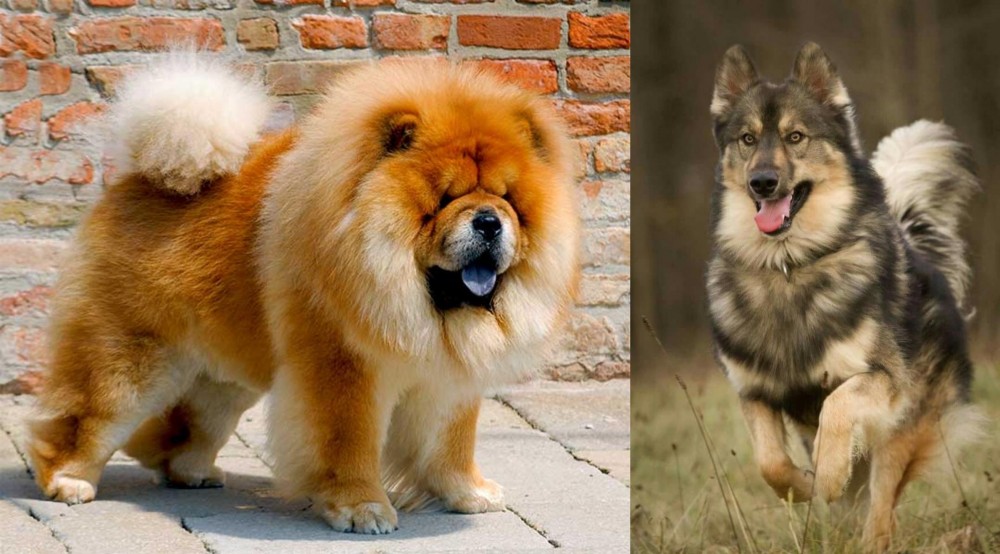 Chow Chow is originated from China but Native American Indian Dog is originated from United States. Chow Chow may grow 17 cm / 7 inches higher than Native American Indian Dog. Chow Chow may weigh 88 kg / 194 pounds lesser than Native American Indian Dog. Chow Chow may live 6 years less than Native American Indian Dog. Both Chow Chow and Native American Indian Dog has almost same litter size. Both Chow Chow and Native American Indian Dog requires High Maintenance.
Chow Chow is originated from China but Native American Indian Dog is originated from United States. Chow Chow may grow 17 cm / 7 inches higher than Native American Indian Dog. Chow Chow may weigh 88 kg / 194 pounds lesser than Native American Indian Dog. Chow Chow may live 6 years less than Native American Indian Dog. Both Chow Chow and Native American Indian Dog has almost same litter size. Both Chow Chow and Native American Indian Dog requires High Maintenance.
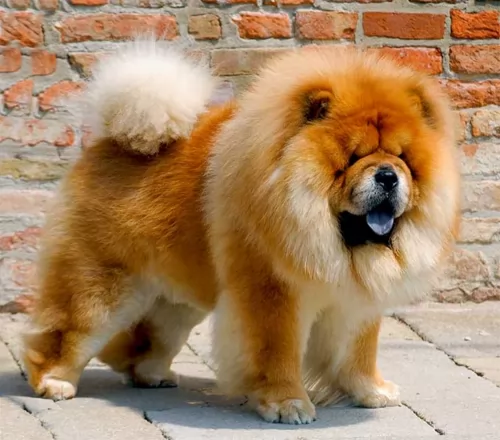 Northern China is the original home of the Chow Chow. In that region of China, the breed was known as the Songshi Quan – “the puffy-lion” dog. They have also been known in China as the “Dog of the Tang Empire” or the Tang Quan. The Chow is believed to be an ancient breed that the Foo Dog, or stone dog guardians of Buddhist palaces and temples, is modeled after. It is one of the most ancient of dog breeds that are still around today.
Northern China is the original home of the Chow Chow. In that region of China, the breed was known as the Songshi Quan – “the puffy-lion” dog. They have also been known in China as the “Dog of the Tang Empire” or the Tang Quan. The Chow is believed to be an ancient breed that the Foo Dog, or stone dog guardians of Buddhist palaces and temples, is modeled after. It is one of the most ancient of dog breeds that are still around today.
It is believed that they have existed for around 2000 years or perhaps even as far back as 3000 years, starting out in Mongolia and migrating to China. The ancientness of the Chow Chow has been validated through DNA testing. In China all those centuries ago, the Chow Chow was born to be a working dog. They hunted, herded, guarded and pulled carts. They went on quests with the Mongolian armies when China was invaded, as well as when the Mongolians invaded the Middle East and Europe later on.
Today’s Canadian Kennel Club has about 350 Chows registered while the AKC gets 10,000 new registrations every year.
 The Native American Indian Dog is an ancient breed, that some consider to be feral. It is a landrace breed that developed with the indigenous peoples North America. These dogs originally looked and sounded like wolves and it is likely that their ancestry is tied to wolves crossed with pre-Columbian American dogs that came to the America’s with the first peoples. There are some that believe the Native American Indian Dog is a connecting line back to the dogs or wolves that over 12,000 years ago were the first to be domesticated by human beings.
The Native American Indian Dog is an ancient breed, that some consider to be feral. It is a landrace breed that developed with the indigenous peoples North America. These dogs originally looked and sounded like wolves and it is likely that their ancestry is tied to wolves crossed with pre-Columbian American dogs that came to the America’s with the first peoples. There are some that believe the Native American Indian Dog is a connecting line back to the dogs or wolves that over 12,000 years ago were the first to be domesticated by human beings.
They are now a rare breed in the wild and a small group of domesticated dogs. Fossil studies in recent years suggests that the Native American Indian Dogs came to North America about 4500 years after the first indigenous peoples. It is believed that the Native Americans bred the dogs that traders and explorers brought with them to the native coyote as well. This created a breed specific to North America and called the Common Native Dog or the Common Indian Dog. The original NAID was a mix of many different breeds of dogs and wild canines.
Today’s NAID is said to be raised on Indian reservations in the United State and represent a mix of Chinook, Husky, German Shepherd Dog and Malamute, along with perhaps some of today’s wolf mixed in. This dog is raised domestically and is socialized to life with humans. They are the last remaining breed from all the Native North American dogs that lived with the original people of the Americas. They are also thought to have an ancestry similar to the Australian Dingo.
They are a devoted, protective and loyal breed though they tend to be shy. They need to be outside for the majority of the day and don’t do well in crates. They need a fenced yard and room to roam. They are working dogs that hunted, pulled sleds and guarded their homes. They still need a job to so.
Today the North American Indian Dog is being bred to replicate the temperament and appearance of the originals. Although there are many breeders working from the founding breeder with original stock, there are only six that are officially given authorization to breed the NAID. They are registered by Terra Pines with the National Kennel Club but not recognized by the AKC and UKC.
The breed name NAID is trademarked by Karen Markel of Majestic View Kennels in the 1990’s. Today the breed is nationally recognized as a breed very much like the original Native American dogs, The breed is intelligent and quite healthy. They enjoy people and engage in many companion activities.
Whatever its true ancestry the current Native American Indian Dog (NAID), today’s version is not recognized by the AKC, but they are recognized by the Dog Registry of America, the Native American Indian Dog Registry and the National Kennel Club.
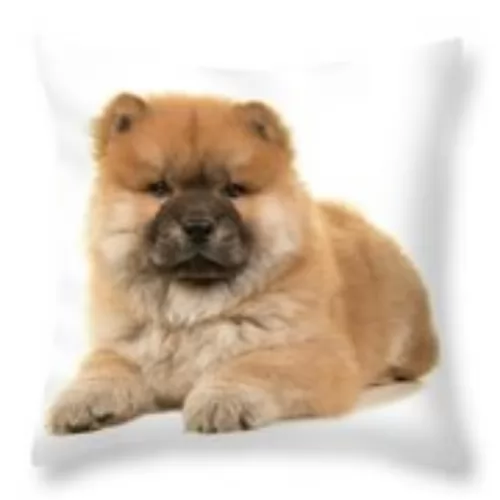 The Chow really does look like a small lion with a black tongue. The dog is sturdy and square with erect, small ears on a broad skull. They have a very dense double coat. Their eyes are deep set and look like almonds, while they all have that very distinctive purple or black tongue. Their lips are also distinctive with their blue color. The nose is black, but some Chows might have a blue nose. The tail is curly.
The Chow really does look like a small lion with a black tongue. The dog is sturdy and square with erect, small ears on a broad skull. They have a very dense double coat. Their eyes are deep set and look like almonds, while they all have that very distinctive purple or black tongue. Their lips are also distinctive with their blue color. The nose is black, but some Chows might have a blue nose. The tail is curly.
These are medium size dogs when it comes to height and weight, but they are powerfully built for their size. Their power is in their compact body holding the energy and strength of a much larger dog. Its hind legs are almost entirely straight, unusual for any dog. They get their lion appearance from the huge ruff that stands behind their heads. Their chest is broad and deep.
 There are two sizes of the North American Indian Dog – they are medium and large. They have dense short double coats, or they have long top coats and a fairly dense undercoat. They come in a variety of colors mostly black or silver but there is also a tortoiseshell. These tortoiseshell colored dogs are considered by Native Americans to be sacred beings. These tortoiseshell dogs are strikingly good looking and are called Spirit Dog.
There are two sizes of the North American Indian Dog – they are medium and large. They have dense short double coats, or they have long top coats and a fairly dense undercoat. They come in a variety of colors mostly black or silver but there is also a tortoiseshell. These tortoiseshell colored dogs are considered by Native Americans to be sacred beings. These tortoiseshell dogs are strikingly good looking and are called Spirit Dog.
They all have the look of a Siberian Husky or Alaskan Malamute with upright ears and almond shaped eyes that are anywhere from amber to brown with some blue. Usually their tails are down and long but can be curled. They resemble the wolf and have that wild, feral appearance. They can be as large as over one hundred pounds or average seventy to eighty pounds. They are strong, alert and intelligent. They are considered to be hypoallergenic, shedding their coat only once a year.
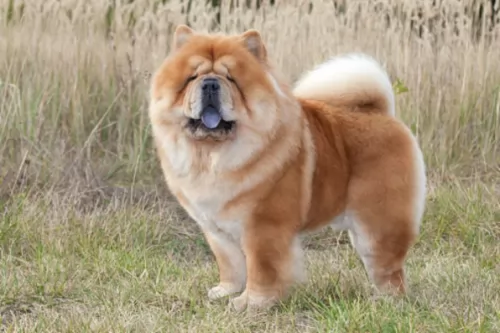 Loyal and true to their family and those they know; the Chow Chow is a little standoffish with strangers. They are very protective and usually attach themselves to one or two people. They are intelligent but stubborn, which can affect your training with them. They need to respect their people and Chows respect hose who take care of them. They can be aggressive toward dogs of their same sex especially if those dogs are the same breed as well.
Loyal and true to their family and those they know; the Chow Chow is a little standoffish with strangers. They are very protective and usually attach themselves to one or two people. They are intelligent but stubborn, which can affect your training with them. They need to respect their people and Chows respect hose who take care of them. They can be aggressive toward dogs of their same sex especially if those dogs are the same breed as well.
They are known to be very clean and many have compared them to cats in that regard. They appear to be dignified and refined. They are usually very quiet but very adaptable dogs.
 This breed is gentle and loving with children.
This breed is gentle and loving with children.
Endurance, strength and good health.
Low adaptability to small living spaces and lack of outside space; don’t do well in crates and need an experienced dog owner.
They are highly intelligent, love to learn and are just a little stubborn.
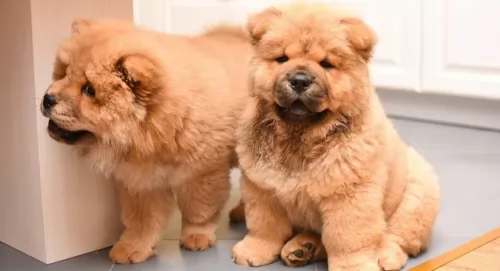 Although an ancient breed that obviously has survived many centuries of trials, the Cho Chow of today is prone to several different health conditions. These include:
Although an ancient breed that obviously has survived many centuries of trials, the Cho Chow of today is prone to several different health conditions. These include:
This condition can require surgery to keep the turning eyelid from injuring the eye ball.
This can cause lameness and arthritis.
This can cause lameness and arthritis.
Make sure you keep the ears clean and keep an eye on them.
 This is a fairly healthy, long lived breed having spent so much of its history in isolation. They are prone to some of the issues that affect all medium to large breeds.
This is a fairly healthy, long lived breed having spent so much of its history in isolation. They are prone to some of the issues that affect all medium to large breeds.
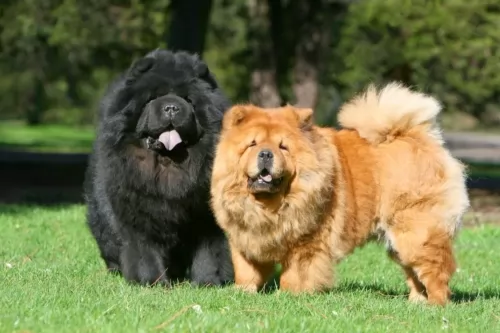 Don’t overfeed a Chow Chow as they are hard workers and big eaters. Feed them at least twice a day.
Don’t overfeed a Chow Chow as they are hard workers and big eaters. Feed them at least twice a day.
This eye disease can lead to blindness if not checked and treated.
These can be removed from an adolescent puppy.
Again, the Chow is susceptible to cancer.
Can lead to heart or kidney problems if left untreated.
Keep a close eye on your Chow Chow skin.
The Chow Chow was developed as working dog, but today’s version is more laid back and doesn’t need excessive exercise. Daily walks will suffice. They live very happily in the city if walked regularly. They are not really a competitive breed outside of obedience and confirmation. They are seldom seen in sports like agility or frisbee.
 Because of their propensity to grow to quickly the puppy should only stay on puppy food for 8-10 months. Feed them a high quality large dog puppy food 3-4 times daily for a total of 2-21/2 cups per day.
Because of their propensity to grow to quickly the puppy should only stay on puppy food for 8-10 months. Feed them a high quality large dog puppy food 3-4 times daily for a total of 2-21/2 cups per day.
Feed a high protein, large dog dry food twice a day for a total of two cups. Do not over feed. Do not feed right before or after exercise do to the risk of bloat.
Healthy, strong long lived dog.
This is not an indoor, couch potato dog. They need exercise and they need space. They won’t do well as apartment dogs unless you can take them to a dog park for over an hour every day. They really need a large fenced in yard. They don’t do well in crates either. He doesn’t understand crates and thinks you are punishing him. They make great hunters, search and rescue dogs, service dogs and therapy dogs. They will succeed at pulling competitions and weight competitions.